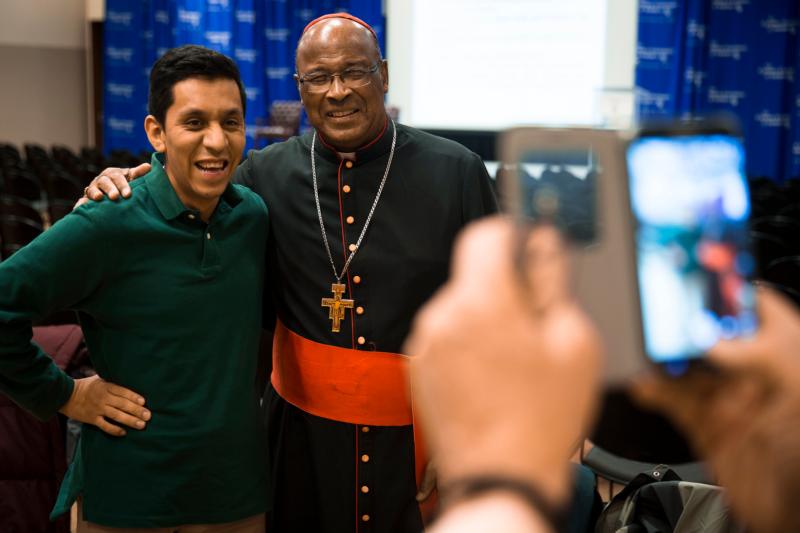
Cardinal Wilfrid Napier of Durban, South Africa, poses for a photo with an attendee of his lecture at The Catholic University of America in Washington, Feb. 17. (CNS photo/Tyler Orsburn)
By Dennis Sadowski
WASHINGTON (CNS) — Pope Francis’ practice of going to people on the margins of society shows the world how reconciliation can occur when people respect each other as equals and uphold human dignity, said Cardinal Wilfrid Napier of Durban, South Africa.
Whether overcoming racial differences, economic inequality or interpretations of gender roles, Cardinal Napier said reconciliation comes only out of respect for the human person.
“If I see you as a human being, if I see you as equal in dignity and in work, then I have to deal with you in a different way. It doesn’t matter if you’re white, black, colored or whatever ideology you hold. If I see you as a human being, it has to make a difference,” Cardinal Napier told Catholic News Service Feb. 17 after a talk at The Catholic University of America.
“I think Pope Francis has hit on something. He’s saying if we go and make sure we look after the people on the margins and treat them well, we are already empowering ourselves,” he said.
The cardinal, one of the presidents of last year’s Synod of Bishops on the family, pointed to the pope’s example during his 50-minute presentation and recalled his experiences as vice president of the Southern African Catholic Bishops’ Conference as South Africa transitioned from its apartheid system in the 1990s.
South Africa continues to struggle with its transition from its apartheid system of racial segregation, which lasted from 1948 until 1994, and Cardinal Napier urged a deeper commitment to true reconciliation among black, colored and white communities.
He reviewed how South Africa’s church groups, including the bishops’ conference, were instrumental in bringing together proponents of freedom for blacks and the white-ruled government to reconcile their differences. He said the efforts also helped limit widespread violence and the possible eruption of civil war during the tumultuous period.
Such work, he said, was rooted in the idea of human dignity and respect.
Cardinal Napier, who was ordained as a Franciscan, also explored how he viewed his work in the reconciliation effort, beginning with his appointment as bishop of Kokstad, South Africa, in 1980. He said it began with the selection of his motto, “Pax et Bonum,” Latin for peace and goodwill. It was, he explained, a favorite greeting of St. Francis of Assisi.
It turned out, he said, that he eventually realized the motto posed a “life-changing challenge to make the Gospel a reality” through “a personal commitment to imitate St. Francis in working for peace and harmony in God’s creation, but especially in God’s human family.”
The motto guided Cardinal Napier’s efforts to build ministries across the Kokstad Diocese in the 1980s as he guided the effort to develop to what he called a “community serving humanity” by meeting with people to listen to their views on what was good in the diocese, what was not, what ministries were in place and needed to be developed, and what ministries needed to be introduced. The idea of listening, he explained, continued during the years of upheaval in South Africa as apartheid was dismantled.
More broadly, Cardinal Napier explained, the motto was an “in-your-face-demand” call to live the Gospel in response to the teaching of “Gaudium et Spes,” the Pastoral Constitution on the Church in the Modern World, the final document of the Second Vatican Council.
That belief led to South Africa’s Christian churches being involved in practices such as conflict mediation that eased the transition of the country’s political culture.
“I’m making the most of this thing of ‘Pax et Bonum’ because I believe it’s what is really necessary for us to do, each one of us, to look at our lives from time to time and try to identify those moments when you actually know God’s hand is directing things. He’s making you do things that you’d never dreamt of and he does it in circumstances that at the time seem to be simply out of your control and in fact under his control,” Cardinal Napier said.
By following such a call to achieve social justice, he continued, participants can better act to resolve racial conflicts, including those that led to the Black Lives Matter movement in the United States, or other areas of disagreement in any community.
“You can’t deal with the problem until you look at the real issue,” he said. “We look at South Africa and we say, ‘What is the real issue? Why are we at each other’s throat 20-something years after independence and this new democracy?’ We have to look at the real issue, identify those. And then we have to look at what are the causes of those issues.”
He said South Africa continues to struggle 22 years into its new system of government because “we have never taken seriously the call to reconciliation.”
He called for a renewed commitment to reconciliation based on equality and dignity in South Africa as well as around the world, especially in communities where simmering tensions prevent people’s hopes and dreams from being fully realized and basic human rights are not assured.






